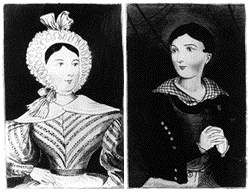Warrior Women and Popular Balladry, 1650 - 1850
Review by Mark Gregory
Female Rambling Sailor
Warrior Women Ballad titles
"Female Warrior ballads are success stories. Highly conventionalized,
they sing of valiant "Nancys" and "Pollys" who defy
oppressive parents, don men's clothing, sail the seas, and fight cruel wars.
Inevitably their masquerading heroine - a model of bravery, beauty and pluck
- proves herself deserving in romance, able in war, and rewarded in both."

In her book "Warrior Women and Popular Balladry, 1650 - 1850",
Dianne Dugaw defines and analyses an area of folklore in the English speaking
(and particularly singing) world. Ballads with titles like "The Captain
of Love", "The Female Drummer", "Wounded Nancy's Return",
"The Wandering Virgin", "The Lady Turned Soldier" and
"The Female Rambling Sailor". Having gathered together something
like 120 such songs she evaluates what they tell us of women and men, and
the society they lived in. What a number of scholars and folklorists have
tended to see as an expression of lonely male fantasy, Dianne Dugaw regards
as evidence of lived reality.
"The age in which the ballads flourished not only recognised in women
but expected of them -- lower-class women in particular -- the same physical
toughness and energy we find in the Female Warrior"
"... eighteenth-century women had good reason to engage in activities
similar to those described in the ballads: leaving home and family, travelling
alone, bearing arms, engaging in trickery, and surviving on their own by
hook or by crook."
they mustered their soldiers by two and by three
and the foremost in battle was Mary Ambree
Apart from pointing to the evidence of women's participation in all kinds
of manual labour, in all kinds of sports including hunting and boxing, Dianne
Dugaw also shows how great a part women played in the decentralised armies
and navies of the eighteenth and even nineteenth century. She quotes from
an account of the 1798 Battle of the Nile "Any information we got was
from the boys and women who carried the powder. The women behaved as well
as the men, and got a present for their bravery from the Grand Signor."
She argues that the refusal of the Medal Committee to reward two women who
claimed medals for their part in the battles of the Nile and Trafalgar "is
a fascinating corroboration of the widespread presence of women in the military
... In the Committee's words, "there were many women in the fleet equally
useful, and it would leave the army exposed to innumerable applications."
It was in the Bay o' Biscay she aloft like lightning flew
Respected by the officer and all the joyful crew
In battles she did boldly run and she feared nae wound nor scar
And did her duty by the gun on board a man o' war
Dianne Dugaw also considers the fashion of cross-dressing and masquerade,
the seventeenth and eighteenth century exploitation of "the transforming
properties of apparel". It was a period of disguise, and not at all
accidental that the Female Warrior ballads are so popular in a period of
"pervasive fascination with cross-dressing". If the popularity
of these ballads reached their peak at this time it is also not surprising
that the Victorian era should see their gradual decline. As Dianne Dugaw
explains "an agenda of centralization and reorganization transformed
military life, creating in conjunction with an ascendant empire, the modern
army and navy. Whatever unofficial structures and sanctions had left space
in the system for women disappeared in this renovated war machine. In it,
real-life Female Warriors became much less tolerated, much less possible."
Coupled with that, and in the wake of the French Revolution, came the "campaigns
to "civilize" the common people." Part of this reform movement
was the "promulgation of female delicacy and passivity as an ideal."
Deliberate action was also taken to replace the literature of the streets
with other songs and stories, where heroines are "frail, long-suffering,
innocent, faithful, forgiving." None of these manufactured heroines
would appear "in male attire, taking over ships, reefing sails, and
firing cannons." The two century tradition of Female Warrior was under
attack.
Seven years and better a Captain I've been
You may know all that while what a fortune I've won
But now my commission I intend to bestow
On my faithless comrade who a private does go
Warrior Women is a great source of ideas and insights and so wide-ranging
that it is hard to do justice to. Certainly Dianne Dugaw shows how interestingly
this group of songs speak to us across centuries of change.
"Such is her success in masquerading that the ballads leave us with
a world that is no longer -- if it ever was -- a transparent and uncomplicated
place where "women" are women and "men" are men. Rather
the Female Warrior ballads conjure up a world where, for all we know, the
soldier boys next to us may not be boys at all... Epitomising both genders,
she simultaneously destabilises the system which divides them... the Female
Warrior enacts her heroism by rules which she ultimately contradicts. Looking
like a man, acting like a man, being celebrated as a man, she is a perfect
woman."
Warrior Women and Popular Balladry 1650-1850
Dianne Dugaw The University of Chicago Press 1996 $14.95